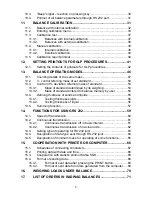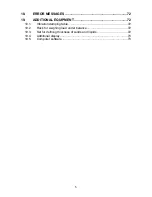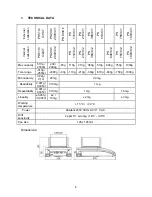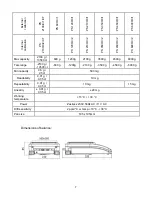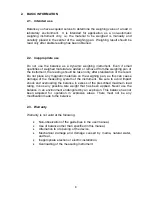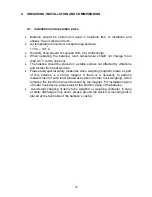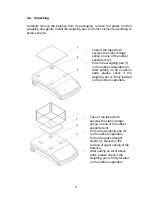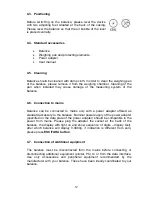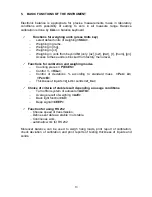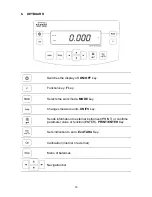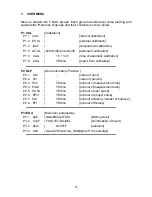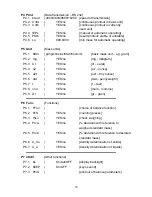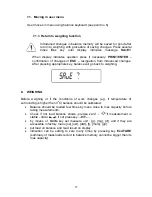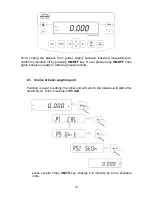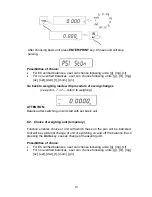
4
10.3.
“Beep” signal – reaction on pressing key ............................................. 30
10.4.
Printout of all balance parameters through RS 232 port ...................... 31
11.
BALANCE CALIBRATION ........................................................... 31
11.1.
Balance with internal calibration .......................................................... 32
11.2.
Entering calibration menu .................................................................... 33
11.3.
Calibration test ..................................................................................... 37
11.3.1.
Balances with internal calibration ............................................... 37
11.3.2.
Balances with external calibration .............................................. 38
11.4.
Manual calibration ................................................................................ 39
11.4.1.
Internal calibration ...................................................................... 39
11.4.2.
External calibration ..................................................................... 40
11.5.
Calibration report printout .................................................................... 40
12.
SETTING PRINTOUTS FOR GLP PROCEDURES ...................... 41
12.1.
Setting the contents of printouts for GLP procedures .......................... 42
13.
BALANCE OPERATING MODES................................................. 46
13.1.
Counting details of the same mass ...................................................... 47
13.2.
+/- control referring mass of set standard ............................................ 50
13.3.
Control of % deviation referring mass of standard ............................... 53
13.3.1.
Mass of standard determined by its weighing ............................ 53
13.3.2.
Mass of standard entered to balance memory by user .............. 54
13.4.
Defining thickness of solids and liquids ............................................... 55
13.4.1.
Testing thickness solids ............................................................. 56
13.4.2.
Testing thickness of liquid .......................................................... 56
13.5.
Summing function ................................................................................ 57
14.
FUNCTIONS FOR USING RS 232 ................................................ 59
14.1.
Speed of transmission ......................................................................... 60
14.2.
Continuous transmission ..................................................................... 61
14.2.1.
Continuous transmission off in basic interval ............................. 61
14.2.2.
Continuous transmission of in actual units ................................. 62
14.3.
Setting type of operating for RS 232 joint ............................................ 63
14.4.
Designation of data type sent through RS 232 joint ............................. 64
14.5.
Designation of minimum mass for operating of some functions ........... 65
15.
COOPERATION WITH PRINTER OR COMPUTER ..................... 66
15.1.
Schedules of connecting conductors ................................................... 67
15.2.
Printing data with date and time ........................................................... 68
15.3.
Cooperation with statistic printout Kafka SQS ..................................... 68
15.4.
Format of sending data ........................................................................ 68
15.4.1.
Format of sent data after pressing the PRINT button ................. 69
15.4.2.
Format of sent data for orders generated from the computer ..... 69
16.
WEIGHING LOADS UNDER BALANCE ...................................... 70
17.
LIST OF ORDERS IN RADWAG BALANCES ............................. 71
Содержание PS Series
Страница 2: ...2 JUNE 2008...
Страница 35: ...35...
Страница 48: ...48 if you want to choose one them e g 20pcs press ENTER PRINT and proceed as shown on picture...
Страница 58: ...58...




